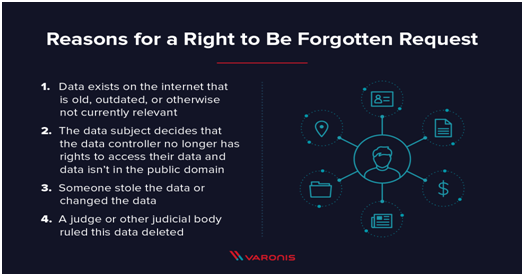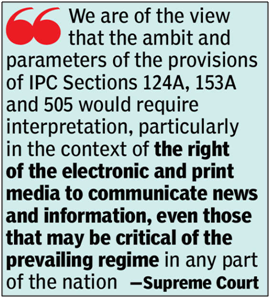

Context
The Centre has told the Delhi High Court that the right to be forgotten is ‘evolving’, which was held in the SupremeCourt’s landmark Judgement in 2017 as a facet of the ‘Right to Privacy’.
Background
- The right to be forgotten, also known as the right to erasure, was established in the European Union in 2014.
- In India, the Personal Data Protection Bill, 2019 provides for a mechanism to implement this concept, though it is not an absolute right.
- In 2017, a nine-judge constitution bench headed by then Chief Justice JS Khehar ruled that the Right to privacy is an intrinsic part of the Right to Life and Personal Liberty under Article 21 and entire Part III of the Constitution.
Analysis
What is the Right to be forgotten?
- It is the right to have publicly available personal information removed from the internet, search, databases, websites, or any other public platforms, once the personal information in question is no longer necessary, or relevant.
- The RTBF gained importance after the 2014 decision of the Court of Justice of the European Union (“CJEU”) in the Google Spain case.
- In the Indian context, the Supreme Court in Puttaswamy v. Union of India, 2017 noted that the RTBF was a part of the broader right of privacy.
- The RTBF emerges from the right to privacy under Article 21 and partly from the right to dignity under Article 14.
What is the Right to Privacy?
- In the Puttaswamy v. Union of India case, 2017, the Right to Privacy was declared a fundamental right by the Supreme Court.
- The right to privacy is protected as an intrinsic part of the right to life and personal liberty under Article 21 and as a part of the freedoms guaranteed by Part III of the Constitution.

|
Decisions of High Courts
|
How does the judgment impact, different stakeholders?
- For Citizens: The citizen will benefit from the judgment as they will be allowed to preserve their personal details from being in Public.
- Citizens no longer need to file a case in order to request for information from search engines to be removed.
- For Tech-giants: Tech Giants like Google, Twitter, and Facebook have opposed this judgment, as they say, they can't remove every detail of its user or regulate the content flowing.
- For Government:Government has a mixed reaction to this, as they say, there are many norms already inconsistent with privacy.
Some issues involved with this Judgement
- Privacy vs. Information: It brings the person’s right to be left alone, derived from Article 21, directly in conflict with the rights of the media to report on issues, flowing from Article 19.
- Enforceability against Private Individuals: This raises the question of whether fundamental rights can be enforced against the private individual, which is generally enforceable against the state.
- Article 15(2), Article 17, and Article 23 are the only provision in the constitution of India that protects a private act of a private party that is challenged based on its violation of the Constitution.
- Misleading Judgements: Courts in India have repeatedly either accepted or rejected the application of RTBF while completely ignoring the wider constitutional questions associated with it.
- Despotic Government: Authoritarian governments can use this to remove information that puts them under a bad light or puts information out there that they wouldn’t otherwise put out in the public domain.
Laws in other countries
- The European Union in 2018 adopted the General Data Protection Regulation (GDPR),in which it provides for the right to the erasure of certain categories of personal data — that which is considered no longer necessary, that for which consent has been withdrawn or processing of which has been objected to, personal data unlawfully processed, and data where there is a legal obligation for erasure.
- In Russia in 2015 enacted a law that allows users to force a search engine to remove links to personal information on grounds of irrelevancy, inaccuracy, and violation of law, while Turkey and Siberia have also given the recognition it to ‘some extent’.
- Courts in Spain and England have also given verdicts on the subject.

Government Intervention in India
- Personal Data Protection Bill 2019: To provide for the protection of privacy of individuals relating to their Personal Data and to establish a Data Protection Authority of India for the said purposes and the matters concerning the personal data of an individual.
- Framed on the recommendations of BN Srikrishna Committee (2018).
- Information Technology Act, 2000: Provides for safeguard against certain breaches in relation to data from computer systems. It contains provisions to prevent the unauthorized use of computers, computer systems, and data stored therein.
What is the position in India?
- The right to privacy has already been recognized as a fundamental right in the K S Puttaswamy judgment (2017) and the ‘right to be forgotten’ is evolving in India.
- The Personal Data Protection Bill, 2019 contains provisions for the doctrine of the ‘right to be forgotten’. As of now, no laws have been passed in this regard.
Conclusion
The Supreme Court of India opined under the Ram Jethmalani vs Union of India case that “it is important that human beings should be allowed domains of freedom that are free of public scrutiny unless they act unlawfully.” ‘Right to be forgotten’ is a fairly new concept in India and is expected to take some more time before we can see it in the Law books.



